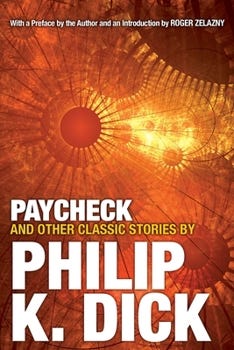Paycheck by Philip K. Dick
A few weeks ago, we reviewed the sci-fi cop thriller Minority Report (2002). The mashup between policing and sci-fi is a surprisingly popular one. The leading innovator in this genre might be author Philip K. Dick. Minority report was based on the Dick novella The Minority Report 1952.
Dick’s writings were used to make several other films including Blade Runner, Screamers, The Man in the High Castle, and A Scanner Darkly. After seeing his influence, I wanted to give his writing a shot. I started with the novella, Paycheck. I wasn’t disappointed.
Dick’s works often revolve around a dystopian future. Cops play a large role, but often a negative one. A cog in the police state that seems omnipresent in the blighted tomorrow.
Paycheck gives more of the same, but Dick leaves the reader guessing about who the bad guys are here, the cops or the corporations.
Dick starts us off with a great premise. A man, Jennings, has been working for a mysterious and secretive corporation for two years, using his expertise in electrical engineering. He has been promised a small fortune of 50,000 “credits” as his compensation. The catch is, at the end of the two years, his memory of the work is erased. He comes into the story as a man to whom two years ago was yesterday. He was expecting it but is disorientated.
When Jennings goes to collect his money, he finds that he has signed a waiver insisting that he forfeit the 50,000 in exchange for the contents of an envelope that he apparently put together himself during his two-year work stint. He is shocked and horrified.
The entire contents of the envelope are as follows.
· A length of fine wire
· A bus token
· A ticket stub
· A green strip of cloth
· An electronic key
· Half of a broken poker chip
· A postage receipt
50k for this?
In his two-year hiatus, the American government has fallen, replaced by an authoritarian police state. The cops want to know about the secretive corporation that Jennings has been working for and place him under arrest. Jennings manages to escape, and is on the run, the cops close behind through the tale. The police here are foreboding, omnipresent, and nameless by design.
The story unwinds from there. The reader is left unsure of who is the enemy of the people in this world, the police state or the corporate masters. An interesting commentary on American life from a dystopian standpoint. It is only at the end we find out the truth.
Dick spins up an entire world in this short story. Painting a quick and easy to follow picture of a bleak future. It is at once innovative and yet also filled with familiar narratives about society and governance.
Dick keeps it pithy here. He allows a quick one-line explanation to account for the broad landscapes of this future. It is a great tool that keeps the plot moving without extra verbiage. He allows the reader to paint the picture.
As Jennings navigates his current situation, the need for each item becomes apparent. The story is built around those 7 items. A brilliant premise for a great story.
Paycheck is a novella, more than a short story, but not a full book. It’s a bit less than 300 pages but they are short. You can knock this out in a day or two. The style of this book leaves a lot to the imagination, and it is a fun read. If you want to see someone else’s take on this story, you can watch the movie by the same name starring Ben Affleck. It was made in 2003 and apparently takes liberties with the original tale. Enjoy the book. I passed on the movie.
Thanks for reading The Ops Desk. Stay Safe!





